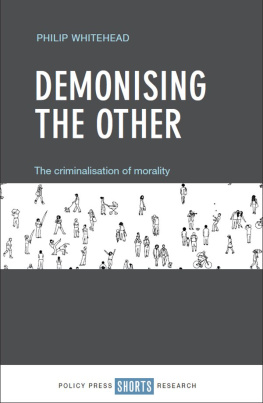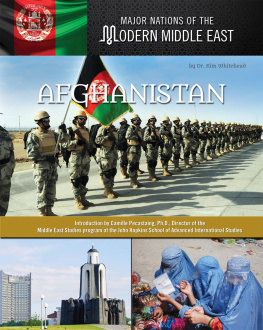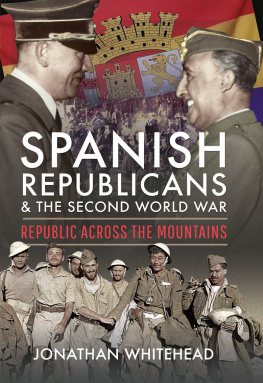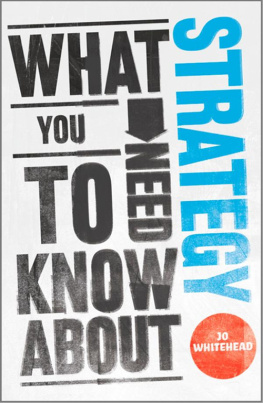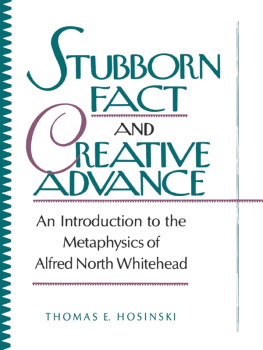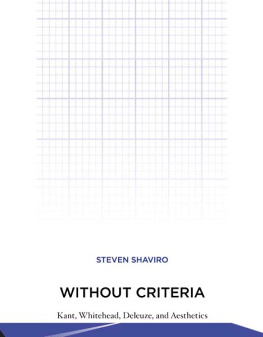PHILIP WHITEHEAD
DEMONISING THE OTHER
The criminalisation of morality

First published in Great Britain in 2018 by
Policy Press University of Bristol 1-9 Old Park Hill Bristol BS2 8BB UK Tel +44 (0)117 954 5940 e-mail
North American office: Policy Press c/o The University of Chicago Press 1427 East 60th Street Chicago, IL 60637, USA t: +1 773 702 7700 f: +1 773-702-9756 e:sales@press.uchicago.edu www.press.uchicago.edu
Policy Press 2018
British Library Cataloguing in Publication Data
A catalogue record for this book is available from the British Library.
Library of Congress Cataloging-in-Publication Data
A catalog record for this book has been requested.
ISBN 978-1-4473-4341-7 (hardback)
ISBN 978-1-4473-4343-1 (ePub)
ISBN 978-1-4473-4344-8 (Mobi)
ISBN 978-1-4473-4342-4 (ePDF)
The right of Philip Whitehead to be identified as the author of this work has been asserted by him in accordance with the Copyright, Designs and Patents Act 1988.
All rights reserved: no part of this publication may be reproduced, stored in a retrieval system, or transmitted in any form or by any means, electronic, mechanical, photocopying, recording, or otherwise without the prior permission of Policy Press.
The statements and opinions contained within this publication are solely those of the author and not of the University of Bristol or Policy Press. The University of Bristol and Policy Press disclaim responsibility for any injury to persons or property resulting from any material published in this publication.
Policy Press works to counter discrimination on grounds of gender, race, disability, age and sexuality.
Cover design by Policy Press
Front cover: image kindly supplied by istock
Reader's Guide
This book has been optimised for PDA.
Tables may have been presented to accommodate this devices' limitations.
Image presentation is limited by this device's limitations.
Desire, at the end, was a malady, or a madness, or both. I grew careless of the lives of others. I took pleasure where it pleased me, and passed on.
(Oscar Wilde, 1986, p 152)
I have always believed that it is only in association with others that one finds oneself and, for an artist, contact with other artists is absolutely necessary for the growth of his personality.
(Peter Ackroyd, 1983, p 64)
In this context the unquestioned hegemony of the market is accompanied by the exhibition of a penal power against the new enemies of the existing order.
(De Giorgi, 2006, p 118)
Human existence is primordially a matter of mutual recognition, and it is only through mutual recognition that we are self-aware and strive for the social meanings in our lives.
(Solomon, 1988, p 68)
Contents
Prologue
The ethical question confronting all of us without exception, and with a pressing urgency, is how to live alongside each other where the other person is our neighbour, not our competitor or disposable enemy. We are all the other to each other, a relation that sometimes descends into relegation and demonisation. This short monograph refines thinking on the subject of the other. In doing so, it rejects the proposition that othering, as the ascription of a pejorative status, is an inevitable feature of human life. The reader will be invited to consider that a transformative, ethically informed, political act can reduce the negative imputation of the other. If the conditions of existence under which we conduct our lives at any given moment are a contingent creation, if not a freakish biological accident (Dawkins, 2006; Harari, 2014), then the political and economic, the ethical and cultural, can be reconstructed to achieve different outcomes. Although it is necessary to frame the process and function of othering within a broad stream of history, I also include an organisational perspective from the criminal justice system. With one notable exception, there is a paucity of monographs solely dedicated to the other in criminal justice and penal policy. This notable exception (at the time of writing) is an edited collection on Punishing the Other (Eriksson, 2016), which applies Bauman's (1989) thesis on the social production of immorality to exclusion, punishment and criminalisation. It is asserted that, 'In short, this book provides a critical analysis of social distancing in action and, where appropriate, a discussion on where morality is located within such processes and outcomes' (Eriksson, 2016, p 2). The Eriksson collection contains case studies on the Other (the upper case is used throughout the text). It also reintroduces the much-needed moral dimension to criminal justice, penal policy, immigration as the control of strangers and the social process of othering. Specifically, on the moral contestation of othering, Eriksson utilises Bauman (1989), where, with traces of Schweitzer and Bonhoeffer (see Whitehead, 2015a; see also ), the immoral is human behaviour that avoids the responsibility of the self for the other. In other words, the other is constituted as disposable enemy rather than neighbour.
It is churlish not to acknowledge the contribution of Punishing the Other to empirical research on, theorisation of and manifestations of the other. However, it does not go far enough towards a resolution of the problem it addresses. Consequently, there is scope to: broaden our thinking to incorporate a longer-term stream-of-history perspective; acknowledge troubling transformations imposed upon the criminal justice system by a succession of 'modernising' governments; foreground moral responses to contest the production of the relegated and demonised other; and forge a new agreement on ethical priorities to establish the conditions of existence that benefit all of us. These four themes represent the four substantive chapters of this monograph. Within the parameters of these four chapters, I will refer to the transcendental materialist perspective (see Hall, 2012), and the three orders of Imaginary, Symbolic and Real in the company of Lacan and iek. This will be explained later. Accordingly, it is imperative to think about the other in relation to macro (historical, political, material conditions and ideological commitments), mezzo (organisational transformations) and micro (human subjectivity), which will feature in what unfolds later. The scope most certainly exists to contest othering: to proceed from the construction and function of othering through new political and ethical commitments to change the way we organise ourselves and think about each other. Therefore, it is possible to reframe the contours of the debate and to move things on from where they reside at present.
There is also scope to produce a more nuanced theorisation of the other. Eriksson and her colleagues (Eriksson, 2016) assuredly theorise the other within the organisational context of criminal justice and penal policy. However, we should acknowledge:
How extremist and anti-ethical ideologies have the potential to establish themselves within our neurological circuits to foster prejudice, bitterness and resentment that culminate in harms directed against others. These harms include negative attitudes towards race, disability, transgender, even facial appearance (see Chakraborti and Garland, 2015). Nevertheless, this constitutes a contingent not permanent condition of existence.
Social distancing, the opposite of proximity, prises open the space to erode our responsibility for others (Bauman, 1989).
Elongating the political and social hierarchy exacerbates inequality, which, in turn, weakens social bonds (Wilkinson and Pickett, 2009).
Next page
